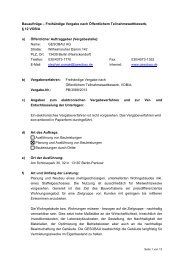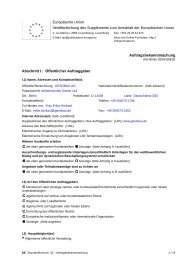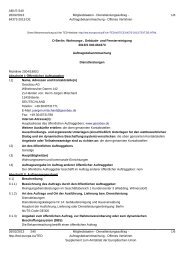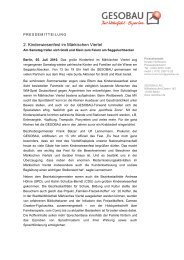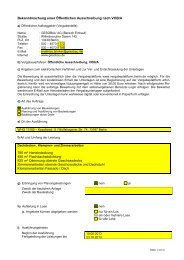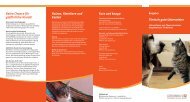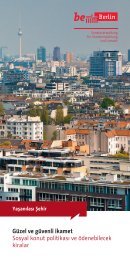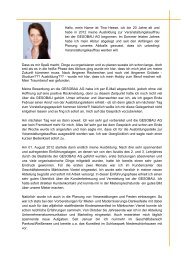A good and secure home - Degewo
A good and secure home - Degewo
A good and secure home - Degewo
You also want an ePaper? Increase the reach of your titles
YUMPU automatically turns print PDFs into web optimized ePapers that Google loves.
A city worth living in<br />
A <strong>good</strong> <strong>and</strong> <strong>secure</strong> <strong>home</strong><br />
Social housing policy <strong>and</strong><br />
affordable rent
2<br />
© SenStadtUm<br />
Dear Berliners,<br />
Berlin is becoming ever more interesting in its role as the German<br />
capital <strong>and</strong> as a prime location for culture, education,<br />
science <strong>and</strong> research. People from all over the world visit our<br />
city as tourists, stop here for a longer sojourn or decide to<br />
stay here permanently. This is a great enrichment for our city<br />
life. It creates jobs, strengthens our future prospects <strong>and</strong> allows<br />
our city to grow.<br />
However, these manifold opportunities are accompanied by<br />
certain side effects, primarily affecting the housing <strong>and</strong> real<br />
estate market. Growth makes prices rise. Rents in our city are<br />
still far from those charged in other German cities or European<br />
metropolises. Yet still the currently occurring price increases,<br />
to be observed with rental contracts for new property<br />
in particular, are a cause for concern. They cause a<br />
decrease in the supply of inexpensive rental dwellings, upon<br />
which those households in particular are dependent which<br />
due to their personal or family situation cannot currently<br />
profit from the opportunities offered by our city’s growth.<br />
These rent increases limit the choice for “starting households“<br />
which are still in a phase of education, career entry or<br />
starting a family.
As far as counteracting rent increases is concerned, the options<br />
available to the State of Berlin are limited. Conditions in<br />
the housing sector are determined by private decisions made<br />
in the financial <strong>and</strong> real estate markets. Rent, tax <strong>and</strong> zoning<br />
law is predominantly federal law. Countermeasures such as<br />
financially effective public investments, subsidies or transfer<br />
payments are restricted by Berlin’s still very difficult budgetary<br />
situation.<br />
We are not, however, completely without influence on housing<br />
<strong>and</strong> rent policy. The instruments of urban planning <strong>and</strong><br />
building permission legislation allow us to determine what<br />
may be built where <strong>and</strong> how. Providing state-owned plots of<br />
l<strong>and</strong> for building supports housing construction, <strong>and</strong> our tenancy<br />
law initiative in the Bundesrat makes proposals in defence<br />
of tenants’ interests.<br />
3<br />
Our most important partners in housing policy are the municipal<br />
housing societies, which today manage around 17<br />
percent of Berlin’s rental housing. For this reason, the Senate<br />
of Berlin has formed an “Alliance for Social Housing Policy<br />
<strong>and</strong> Affordable Rent“ with the municipal housing societies.<br />
With this brochure, I would like to inform you about the most<br />
important goals <strong>and</strong> topics of this alliance.<br />
Yours sincerely,<br />
Michael Müller<br />
Senator for Urban Development <strong>and</strong> the Environment
4<br />
Alliance for Berlin<br />
© Verb<strong>and</strong> Berlin-Br<strong>and</strong>enburgischer Wohnungsunternehmen e.V. (BBU)<br />
In order to combat the increasingly narrow market for affordable<br />
living space, the Senate Department for Urban<br />
Development <strong>and</strong> the Environment <strong>and</strong> the Senate Department<br />
of Finance have agreed to form the “Alliance for Social<br />
Housing Policy <strong>and</strong> Affordable Rent“ with the six municipal<br />
housing societies of Berlin. The Alliance was signed<br />
on 4 September 2012, is valid initially until 2016, <strong>and</strong> specifies<br />
solutions <strong>and</strong> measures with which the partners will<br />
ensure the availability of affordable housing.<br />
Berlin is growing, rents are increasing<br />
Especially in the sought-after inner-city areas, the dem<strong>and</strong><br />
for rental accommodation is growing faster than the supply.<br />
For this reason, the housing market surplus is dwindling ever<br />
more, <strong>and</strong> rents are rising faster than in the past decade –<br />
especially in new buildings, but increasingly also in the existing<br />
building stock. The main reasons: our city is growing. Ever<br />
more people are moving to Berlin. At the same time, more<br />
<strong>and</strong> more Berliners are living alone. Already today, 54 percent<br />
of all Berlin households are single-person households.
Senator Michael Müller (Senate Department for Urban Development <strong>and</strong> the Environment)<br />
<strong>and</strong> member of the board of directors Maren Kern (Verb<strong>and</strong> Berlin-Br<strong>and</strong>enburgischer<br />
Wohnungsunternehmen e.V., Federation of housing companies <strong>and</strong> cooperatives<br />
in Berlin <strong>and</strong> Br<strong>and</strong>enburg) at the signing of the Rent Alliance with the board<br />
members <strong>and</strong> managements of the six municipal housing societies Hendrik Jellema<br />
(GEWOBAG), Stefanie Frensch (HOWOGE), Jörg Franzen (GESOBAU), Lars Ernst (WBM),<br />
Frank Bielka (degewo) <strong>and</strong> Ingo Malter (STADT UND LAND)<br />
5<br />
Strong partners take countermeasures<br />
The goal of the housing policy of the<br />
Berlin Senate is to keep rents in our<br />
growing city affordable <strong>and</strong> to provide<br />
adequate living space for households<br />
whose income falls behind the general<br />
income trend. The diversity <strong>and</strong> character<br />
of individual neighbourhoods must<br />
be preserved. The typical “Berlin mixture“<br />
should be strengthened so that<br />
people with different income levels, of<br />
different social <strong>and</strong> cultural backgrounds,<br />
continue to live together in our<br />
residential quarters.<br />
Senatsverwaltung<br />
für Stadtentwicklung<br />
und Umwelt<br />
Senatsverwaltung<br />
für Finanzen<br />
Berlin’s municipal housing societies are<br />
core partners in implementing this urban<br />
development <strong>and</strong> housing policy.<br />
They create considerable benefits for<br />
our city by<br />
• consequently helping to curb rent<br />
prices through their own rent price<br />
policies,<br />
• playing a leading role in refurbishing<br />
buildings for energy efficiency <strong>and</strong><br />
climate protection,<br />
• adapting their building stock to the<br />
requirements imposed by demographic<br />
change, <strong>and</strong><br />
• actively supporting social, demographic<br />
<strong>and</strong> cultural integration in<br />
Berlin’s residential neighbourhoods.
6<br />
© GESOBAU © GEWOBAG<br />
More flats<br />
The housing stock of the municipal societies is to grow,<br />
through purchase <strong>and</strong> new construction: from 277,000 dwellings<br />
at present to 300,000 in 2016. A larger proportion of<br />
publicly owned dwellings will help to stabilise the rent market.<br />
In future, plots of l<strong>and</strong> belonging to the State of Berlin will be<br />
allocated directly to the municipal housing societies, provided<br />
this leads to expedient building plot realignments suitable<br />
for new construction in fulfilment of the goals of the Rent<br />
Alliance.<br />
In a pilot project, the State of Berlin will provide 14 plots upon<br />
which the municipal housing societies may carry out exemplary<br />
development projects. Through the following requirements,<br />
care will be taken to ensure that each of these projects<br />
leads to the creation of a neighbourhood that fits into its surrounding<br />
residential area in a socially appropriate manner:<br />
• rent spreads,<br />
• proportional allocation of flats to households with a certificate<br />
of eligibility to public housing (“Wohnberechtigungsschein”),<br />
• a contingent of small flats for single-person households,<br />
• a contingent of barrier-free flats, <strong>and</strong><br />
• flats for families with children.
7<br />
© HOWOGE<br />
© degewo<br />
Current examples of such projects are the construction of<br />
280 flats by degewo in Adlershof <strong>and</strong> Köpenick, the construction<br />
of approximately 350 flats by HOWOGE in Lichtenberg<br />
<strong>and</strong> the construction of approximately 270 flats by GESOBAU<br />
in Pankow.<br />
Housing stock expansion through acquisition<br />
Where measures to ease the housing market are advisable<br />
<strong>and</strong> suitable offers available, the municipal housing societies<br />
will acquire such residential property as expediently complements<br />
their existing stock. There are current examples of<br />
such measures as well: degewo <strong>and</strong> GESOBAU have purchased<br />
just under 4,700 flats together; STADT UND LAND has<br />
exp<strong>and</strong>ed its stock by 340 flats. GEWOBAG has acquired 2,100<br />
flats, while HOWOGE has added around 1,500 flats to its<br />
stock.<br />
Student housing<br />
To improve the student housing situation, municipal housing<br />
societies are cooperating with the Berlin student services<br />
(Studentenwerk Berlin) <strong>and</strong> the departments for social issues<br />
of the students’ councils of the Berlin universities.
8<br />
The most important key points of the Rent Alliance<br />
To provide for broad sections of the population, the municipal<br />
housing societies offer living space at affordable rents.<br />
They strive to keep their rent levels bearable following refurbishment<br />
<strong>and</strong> when concluding new contracts, as well.<br />
Lower-income households in particular should be able to find<br />
<strong>good</strong> <strong>and</strong> <strong>secure</strong> housing with the municipal housing societies.<br />
For this reason, in the Rent Alliance, the municipal housing<br />
societies have committed themselves to a discerning rent<br />
policy.<br />
• They limit their general rent increases in privately-funded<br />
housing to a maximum of 15 percent within four years, in<br />
so far as permitted by the Berlin rent index (Berliner Mietspiegel).<br />
• The municipal housing societies limit building modernisation<br />
contributions in privately-funded housing to a maximum<br />
of nine percent of expenses incurred per year. Rents<br />
should still be affordable after modernisation measures<br />
have been carried out.<br />
• In the case of first-time rental contracts, the housing societies<br />
will rent every second flat within the S-Bahn ring <strong>and</strong><br />
every third flat outside it for the local reference rent<br />
(“ortsübliche Vergleichsmiete”) to households which have<br />
a certificate of eligibility to public housing (“Wohnberechtigungsschein”<br />
or “WBS”).<br />
• A joint pool of flats will make fair flat exchanges possible<br />
should a tenant require a flat at least 10 percent smaller<br />
than the one presently let. In the case of an exchange, the<br />
housing societies guarantee that the new gross warm rent<br />
(“Bruttowarmmiete“ – includes net rent <strong>and</strong> all further<br />
unavoidable costs such as heating, street cleaning, etc.)
9<br />
will be less than the old one – all other factors such as location,<br />
furnishing, <strong>and</strong> state of modernisation being equal.<br />
• An individual solution will be sought for tenants who are<br />
unable, for financial or other social reasons, to bear a given<br />
rent increase.<br />
• Following a rent increase for a tenant household to which<br />
social criteria apply, the net cold rent (“Nettokaltmiete”)<br />
should not exceed 30 percent of the household’s net income,<br />
provided the number of household members is appropriate<br />
for the flat size <strong>and</strong> the household’s income is<br />
within the limits defined by the Federal Republic of Germany<br />
for receiving a certificate of eligibility to public<br />
housing (“Wohnberechtigungsschein”). Appropriate flat<br />
sizes <strong>and</strong> the calculation of net household income are defined<br />
in this brochure from page 10 onward.<br />
• If a tenant household receives social security benefits <strong>and</strong><br />
its flat size is appropriate (see appropriate flat size table<br />
from page 10 onward), rent increases will be limited to ensure<br />
that the new rent does not exceed the maximum<br />
government-provided rent benefits.<br />
• Hardship provisions for pregnant women <strong>and</strong> single parents<br />
who are dependent on their social environment, for<br />
senior citizens, for h<strong>and</strong>icapped people, for caregivers <strong>and</strong><br />
for sick or bereaved people ensure that other private hardships<br />
besides income issues can be taken into consideration<br />
in determining the extent of rent increases.<br />
• These individual solutions are also effective for those cases<br />
of social housing in which rent increases are due to the<br />
scheduled reduction of public funding.
10<br />
When is a rent increase limitation possible?<br />
What constitutes appropriate flat size for this purpose?<br />
How is net household income calculated?<br />
As part of their contribution to the Rent Alliance, when implementing<br />
rent increases, the municipal housing societies have<br />
committed themselves to limiting the net cold rent (“Nettokaltmiete”)<br />
to no more than 30 percent of the tenant<br />
household’s net income, provided the household in question<br />
lives in a flat of appropriate size <strong>and</strong> the household’s income<br />
does not exceed the limits set forth uniformly for the Federal<br />
Republic of Germany in the federal housing promotion act<br />
(Wohnraumförderungsgesetz, WoFG).<br />
Appropriate flat sizes according to size of household<br />
Single-person household: no more than 45 m²<br />
Two-person household: no more than 60 m²<br />
Three-person household: no more than 75 m²<br />
Four-person household: no more than 85 m²<br />
Each further household member:<br />
an additional maximum of 12 m²<br />
In cases where the flat is larger than the permitted limit for<br />
the size of the household, no rent limitation is possible.<br />
Income limits<br />
For the intents <strong>and</strong> purposes of determining the application<br />
of rent limitation, household income is the total income of a<br />
household as calculated according to sections 20-24 of the<br />
federal housing promotion act (Wohnraumförderungsgesetz,<br />
WoFG). In WoFG section 9, the income limit (net income per<br />
year) is determined to be<br />
for a single-person household<br />
12,000.00 Euro<br />
for a two-person household<br />
18,000.00 Euro<br />
additionally for each further<br />
household member<br />
4,100.00 Euro<br />
For each child,<br />
the limit is raised by<br />
500.00 Euro
11<br />
Calculation of net household income<br />
Household income is calculated strictly according to sections<br />
20-24 of the federal housing promotion act (Wohnraumförderungsgesetz,<br />
WoFG). The exact wording of this law can<br />
be found (in German) on the website of the Senate Department<br />
for Urban Development <strong>and</strong> the Environment (www.<br />
stadtentwicklung.berlin.de/service/gesetzestexte/de/<br />
wohnen.shtml). The first step is to determine the yearly income<br />
of all household members at the time of the rent increase.<br />
The components of yearly income are defined in sections<br />
21 <strong>and</strong> 22 of the housing promotion act.<br />
From this yearly income, a blanket sum of 10 percent is deducted<br />
for taxes owed on income <strong>and</strong> compulsory contributions<br />
to health, long-term care <strong>and</strong> state pension insurance<br />
(WoFG section 23), provided household members are liable to<br />
taxation. In the case of persons with a severe disability,<br />
young married couples (up to the fifth calendar year following<br />
marriage for spouses who are not older than 40), children<br />
<strong>and</strong> persons with a maintenance obligation regulated by law,<br />
further deductions are made (details in WoFG section 24).<br />
If the net household income calculated in this way is not<br />
higher than the income limit given in the table above (taken<br />
from WoFG section 9 paragraph 2) <strong>and</strong> if the rent increase<br />
will result in a net cold rent which is higher than 30 percent<br />
of the net household income, then the household can probably<br />
claim a rent increase reduction. For an exact calculation<br />
of their income <strong>and</strong> to provide proof of their status, households<br />
wishing to make use of this agreement should contact<br />
their municipal housing society l<strong>and</strong>lord.<br />
There is, however, no legal entitlement to these benefits.
Senate Department for Urban Development <strong>and</strong><br />
the Environment<br />
Section IV - Housing, Urban Renewal, Socially Integrative<br />
City<br />
Württembergische Straße 6<br />
10707 Berlin<br />
Exhibition <strong>and</strong> Information Centre of the Senate<br />
Department for Urban Development <strong>and</strong> the Environment<br />
Am Köllnischen Park 3, 10179 Berlin<br />
U-Bahn lines U2, Märkisches Museum, U8, Jannowitzbrücke<br />
or Heinrich-Heine-Straße<br />
S-Bahn lines S5, S7, S75, Jannowitzbrücke<br />
Bus lines 147, 248, 265, U-Bhf. Märkisches Museum<br />
Exhibition room of the Senate<br />
Department for Urban Development <strong>and</strong> the Environment<br />
Württembergische Straße 6, 10707 Berlin<br />
U-Bahn lines U3, U7, Fehrbelliner Platz<br />
Bus lines 101, 104, 115, Fehrbelliner Platz<br />
www.stadtentwicklung.berlin.de<br />
Titelbild: © Nikolaus Fürcho<br />
Kommunikation<br />
Am Köllnischen Park 3, 10179 Berlin<br />
broschuerenstelle@senstadtum.berlin.de






